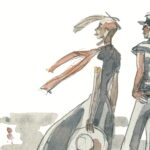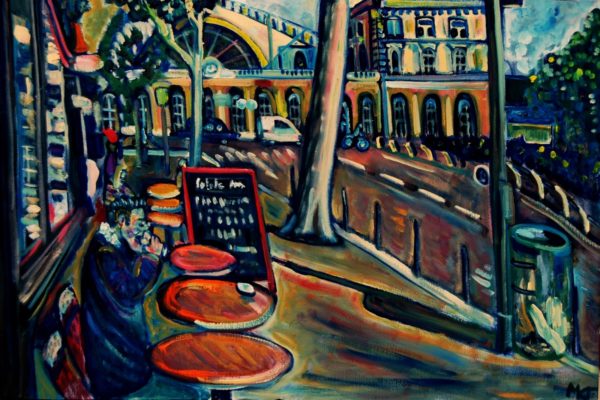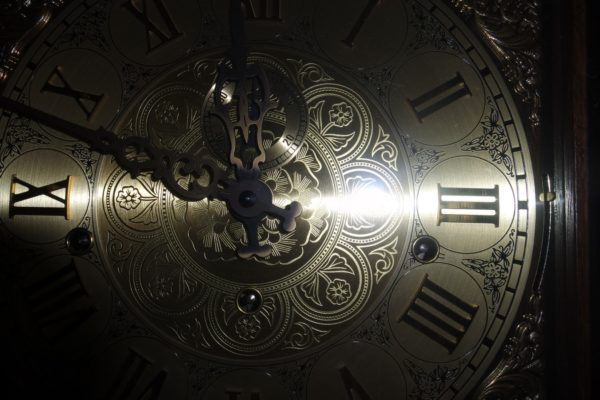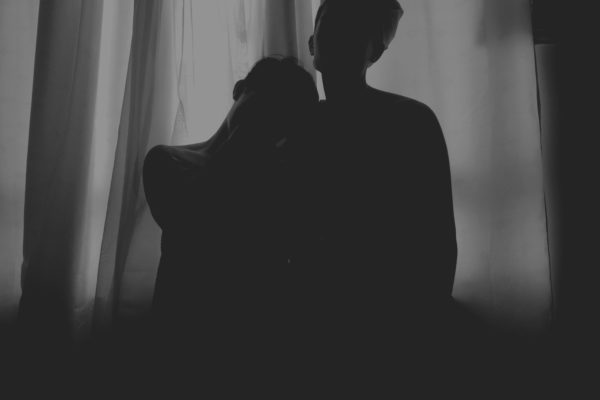“Io traccio il mio bersaglio intorno all’oggetto colpito, io non colgo nel segno, ma segno ciò che colgo, baro, scelgo il mio centro dopo il tiro e come un’arma difettosa di cui conosco lo scarto, adesso miro alla mira”
Con queste parole del poeta romano Valerio Magrelli ci saluta a fine intervista Francesca Garolla. Un incontro informale di un caldo pomeriggio di giugno reso possibile grazie alla disponibilità di Fabulamundi, piattaforma dove trovano spazio la drammaturgia italiana e straniera attraverso traduzioni e mise en-espace. Abbiamo così potuto conoscere meglio Francesca Garolla, il suo mondo poetico ed evocativo e il behind the scences del teatro. Ci siamo immersi nella vita di quest’artista che nasce a Varese nel 1981 e che dopo anni di studio, lavoro e molta esperienza, si diploma in Regia all’Accademia d’Arte Drammatica Paolo Grassi. La collaborazione nel 2004 al Teatro i di Milano come drammaturga, assistente alla regia e attrice e il lavoro da regista e drammaturga dal 2006 e al 2008 hanno portato Francesca Garolla a ottenere riconoscimenti e premi importanti, come quello ricevuto al NEXT nel 2014 per “Non correre Amleto”.
Cosa significa essere una drammaturga oggi in una società in cui il teatro ha forse poco spazio?
Ho deciso di essere una drammaturga relativamente tardi. In realtà ho iniziato a lavorare in teatro presto, quando avevo 23 anni, dopo aver frequentato l’Accademica d’Arte Drammatica come regista, ma mi sono approcciata alla scrittura teatrale pura in seguito. Infatti ho iniziato nel 2010 e quindi ad ora per me sono 8 anni che lavoro come drammaturga. La cosa che mi ha sempre affascinato del teatro è che il teatro è qualcosa che accade proprio in quel presente, le repliche non sono ripetizioni. Vedere uno spettacolo una sera non significa rivederlo tale e quale nella rappresentazione successiva, perché ci sono in gioco delle componenti, e queste componenti sono quelle umane. Questo aspetto unico del teatro è forse ciò che trovo più affascinante; il teatro è un’arte a perdere. Cioè accade in quel momento e si perde nel tempo. Questo fascino, al di là del fatto che il teatro sia stato in un certo senso prevaricato dal cinema e dal modo di comunicare che abbiamo adesso, rende il teatro l’unico luogo in cui l’arte è nel presente in cui accade ed esiste in relazione alla realtà.
Come vedi il futuro per le nuove generazioni, privo di un orizzonte come in “N.N. Figli di nessuno – Nomen Nescio” o qualcosa è forse cambiato?
No, non penso che le generazioni di adesso non abbiano prospettiva, penso che in realtà oggi sia richiesta alle nuove generazioni molta più responsabilità individuale rispetto al passato. Questo perché ho la sensazione che si faccia molta fatica ad essere una collettività e avere la forza tipica di chi, come è stato per i miei genitori, ha fatto parte dei movimenti degli anni ’70. La loro è stata una generazione nata alla fine degli anni ’50 e questo ha significato un passaggio generazionale molto forte. C’era stato il ’68, la legge sull’aborto, quella sul divorzio e poi le lotte degli anni ’70. In definitiva un passaggio generazionale conflittuale. Oggi il mondo è cambiato; oggi ti è chiesta una responsabilità
maggiore. Credo che ci siano delle difficoltà che, seppur in modo diverso, però possano essere in qualche modo considerate per certi versi simili a quelle delle generazioni passate.
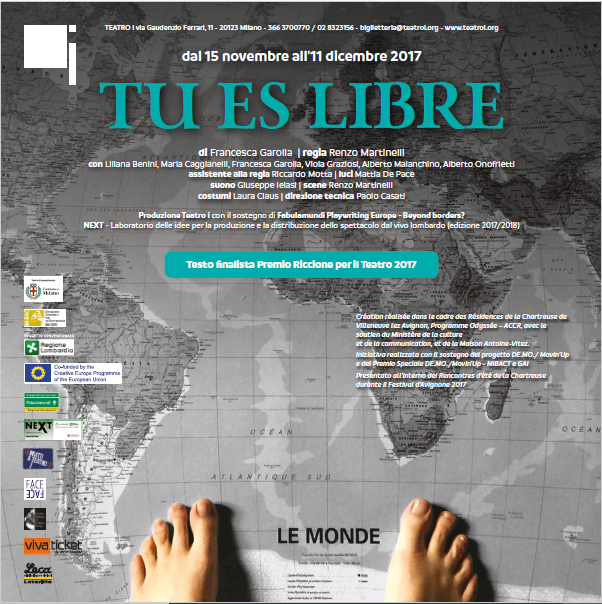
Non ci si può e non ci si deve dare degli alibi, come pensare che il passato abbia costruito un presente che non ci piace. Perché con il proprio presente si può creare un futuro incredibile! Sì, i punti di riferimento sono cambiati nel tempo: la storia ci insegna che cambiando il contesto cambiano i punti di riferimento e a volte sembra come se prima i punti di riferimento fossero di più rispetto ad oggi, per certi versi forse è vero ma per altri non può essere una giustificazione! In “Nomen Nescio” racconto questo. Nato da un’esperienza personale, non tanto nei fatti raccontati quanto invece nel tema generale, ho voluto riportare il messaggio dei miei genitori. Loro non erano per “dare le regole”, perché le avevano combattute, loro erano per “sei libero, fai quello che vuoi”. E io ho quindi ragionato su questo.
“Solo di me -se non fossi stata Ifigenia sarei Alcesti o Medea”, tre donne
protagoniste che vivono un’esistenza desiderando solo di essere, tendendo però continuamente alla morte. Che significato ha per te il dualismo vita-morte, tema centrale di molte opere letterarie?
Tutte e tre le figure, Ifigenia, Alcesti e Medea, hanno a che fare con la morte. Ifigenia si sacrifica per la patria, affinché le navi partano per Argo; Alcesti si sacrifica lei stessa, decide di morire per salvare suo marito, mentre Medea uccide i suoi figli e quindi forse uccide anche una parte di sé. Ragionando su questo in relazione alla femminilità, quello che ho voluto portare in scena è stata una mia riflessione sul fatto che dal mito alla letteratura, dalle fiabe all’attualità è come se le figure femminili per assumere un ruolo e quindi una posizione nel mondo debbano sacrificarsi; devono passare attraverso una morte. Ifigenia, Alcesti e Medea non sono niente fino a quando non diventano significative per il loro sacrificio. È come se attraverso il sacrificio loro diventassero finalmente qualcosa. Viviamo in una società dove diamo per scontata la morte negandola. Noi nel momento in cui nasciamo abbiamo tante qualità, come la stessa mortalità. Con la vita ci è data la morte, che spesso viene negata. Vogliamo vivere all’infinito. Quindi la morte sembra essere qualcosa che non ci appartiene. Prima si
sopravviveva alla morte; oggi è come se la morte non fosse più naturale, come se fosse la stessa tragedia. Quindi come si riesce a elaborare un lutto? La morte non ci appartiene fino a quando non ci riguarda da vicino, altrimenti la morte è numeri!
In “Nomen Nescio” i protagonisti sono due uomini, mentre in “Solo di me” tre donne. Come pensi si guardi oggi verso l’altro, cos’è il rapporto uomo-donna e cos’è invece il rapporto con l’Io?
Noi siamo sempre alla ricerca di un dialogo. Noi siamo essere dialogici, anche quando pensiamo, perché dialoghiamo con noi stessi. Tendenzialmente si procede nel pensiero attraverso il meccanismo domanda-risposta. Però come ci mettiamo in relazione con l’altro? Secondo me, e ne sono profondamente convinta, quando parliamo in realtà “monologhiamo” continuamente. Con un grande tentativo di capire l’altro, noi in realtà vogliamo esprimere il nostro pensiero. Infatti spesso nelle mie opere ho personaggi monologanti. Ad esempio in “Non correre Amleto”, uno dei miei testi, ho fisicamente impostato la pagina in orizzontale, così da poter vedere due colonne di testo distinte dove su una c’è scritto “Lei” e sull’altra “Lui”. Lei è scritto in un tempo e Lui in un altro. Il loro monologo si incastra come se fosse un dialogo, ma in realtà sono monologhi. Questo perché quando parliamo credo che entri sempre in gioco il dialogo che abbiamo con noi stessi. Nel dialogo uomo-donna penso che a fare la differenza sia la dimensione culturale, da cui non si può scappare. Ad esempio infatti in “Nomen Nescio” i protagonisti sono due uomini e non due donne perché il passaggio generazionale nella nostra cultura è padri-figli; noi prendiamo il cognome dei nostri padri. La nostra società è stata e rimane ancora patriarcale, quindi sulle donne c’è una pressione sociale molto
forte, pressione che per altri versi c’è anche sugli uomini, e questo condiziona indubbiamente il dialogo tra uomini e donne.
Come si riesce a trovare l’equilibrio tra realtà e finzione, dando il giusto spazio alla fantasia per farla diventare uno strumento di
comunicazione?
A me non interessa la riproduzione della realtà. Noi siamo sommersi da una società che ci inonda di realtà. Stockhausen quando c’è stato l’attentato alle Torri Gemelle dell’11 settembre aveva dichiarato che non ci sarebbe più stata un’opera d’arte come quella. Il mondo gli si è scagliato contro, ma lui veramente stava a mio avviso solo dicendo che la realtà non è riproducibile è per questo è più forte dell’arte. Io tutti i giorni in metropolitana vedo degli spettacoli interessantissimi. Per questo nella mia arte prendo spunto dalla realtà, elaboro un tema e cerco poi di lavorarci formalmente sviluppandolo, senza sentire il bisogno di riprodurre qualcosa di necessariamente credibile. Nel mondo del teatro la parola “credibile” spesso fa rima con “coerente” ma se ad esempio facciamo riferimento al mio ultimo lavoro, “Tu es Libre”, io racconto la storia di una ragazza francese che decide di partire per la Siria e unirsi all’Aish. Questo è il mio punto di partenza, il mio contesto, ma quello che voglio indagare è quanta libertà siamo in grado di tollerare quando non riteniamo giusta la scelta degli altri. Quindi mi riferisco sempre all’attualità per rielaborarla e raccontarla in modo verosimile, avendo sempre presente però che lo scopo è la riflessione, portare in superficie un mondo sommerso.
Puoi salutarci raccontandoci dei tuoi progetti futuri?
In realtà ho sempre molto lavoro, sono un’autrice ma lavoro sempre molto al Teatro i qui a Milano essendo nella direzione artistica. Ma un nuovo progetto c’è; sto cercando di lavorare sul tema della malattia. Mi piacerebbe indagare su qualcosa che ci riguarda da vicino, che ci condiziona, senza però accorgerci della sua esistenza, come avviene spesso con la malattia. Vivi, ti abitui a qualcosa che credi essere la tua realtà, anche se invece è tutt’altro, una realtà in cui è nascosta un’ombra. Un’ombra che in definitiva ti condiziona. Noi siamo frutto di molteplici storie, le storie che conosciamo come quella della nostra famiglia o quella della nostra società e le storie che non conosciamo e che non controlliamo. Ed è su questo che il mio nuovo lavoro “Io sono testimone” vuole soffermarsi. Noi siamo tutti testimoni di qualcosa e lasciamo a nostra volta una testimonianza.
Intervista di
Valeria Magini
English version:
“I mark my target around the object hit. I don’t hit the mark, I mark what I hit. I cheat. I choose my core after shooting, and, as if I was a damaged weapon whose swerve I know, only now I aim at the aim.”
These words from the roman poet Valerio Magrelli are the final greetings of the interview with Francesca Garolla. We met on a warm evening of June thanks to Fabulamundi, a reality thought for Italian and foreigner dramaturgy, which connects them through translations and mise en-espace. Our time together has been very colloquial and nice, we got to know better Francesca Garolla, her poetics and evocative reality, and her theatrical behind the scenes. We dove in the life of this artist who was born in Varese, Italy, in 1981, and who gets her degree at the Accademia d’Arte Drammatica Paolo Grassi thanks to hard work, education and experiences. In 2004 she begins a collaboration with Teatro i, in Milan where she works as assistant stage manager and actress. After that, she works as director and playwright from 2006 to 2008. Her experience granted her important recognition and prices, like the one won for the play Non correre Amleto to the NEXT event in 2014.
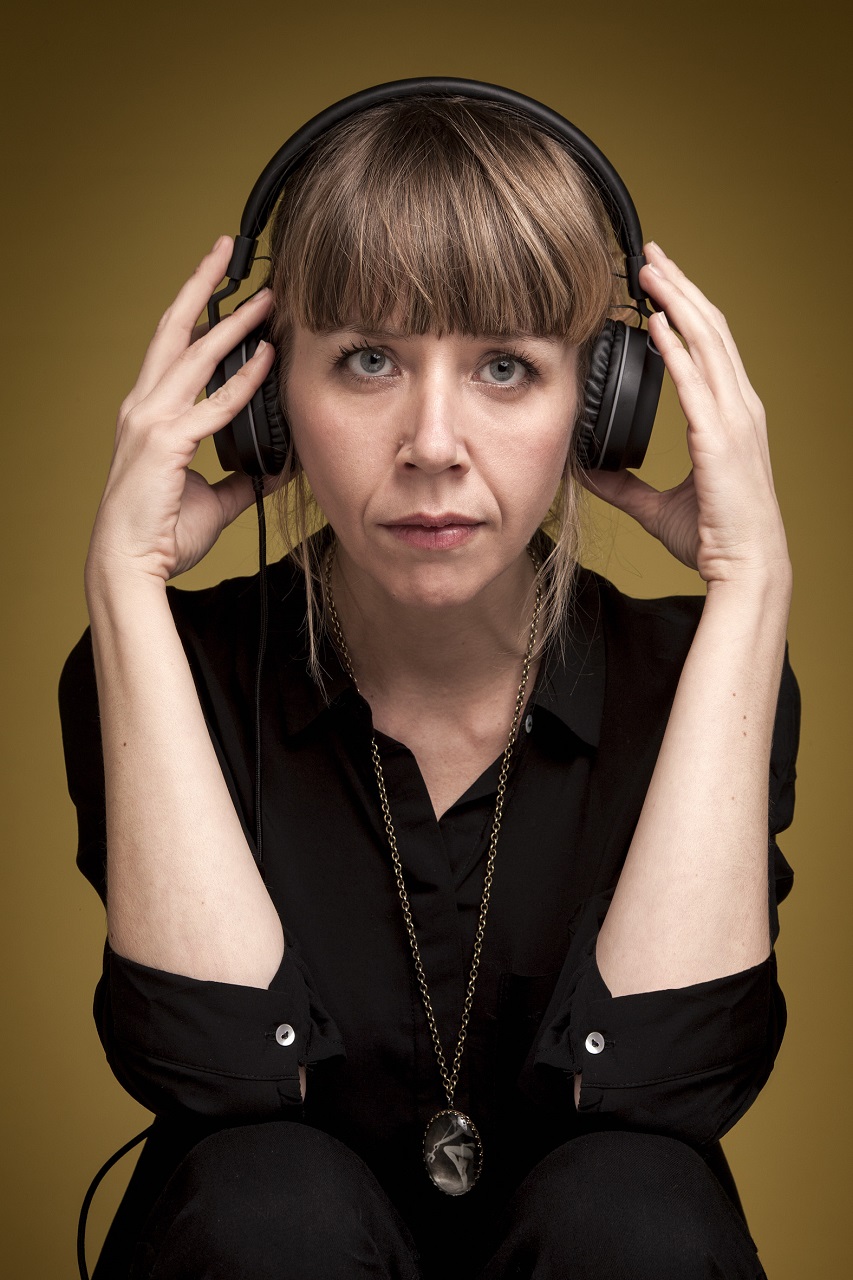
In a society where theatre has probably too little space, what does being a playwright mean?
I decided I wanted to be a playwright rather late, though I started working into theatres quite soon, I was 23, I had just finished my education as director, at the academy of dramatic arts, but I approached the wholesome dramatic playwriting sometime after that. What has always fascinated me is the fact that theatre is something that concerns the present, what happens there, is in the present, all the performances are in the present. Going to see a performance one night is not going to be the same exact thing of seeing in on any other night, because theatre has to deal with elements that are human’s. This is the one peculiarity of theatre that fascinates me the most; theatre is an art that loses itself. What happens over a certain time, gets lost there. This charm makes theatre the only place where its art is in the present and where what happens is related to the actual reality, and that goes beyond the fact that theatre has been overcome by the cinema and our modern ways of communicating.
How is the future of the next generations? Is it as hopeless as in N.N figli di nessuno- Nomen Nescio (Nobody’s children), or has something changed?
Well, I don’t think that present generations do not have any perspective. Actually, I think that what is asked today to people is to bare more responsibilities than in the past. I say this because I think it’s very hard to perceive this society as collective, and it’s very hard to have such a strength like the one my parents had, for example, when they took part in the ’70s movements. They belonged to the generation born in the ‘50s, so they experienced a quite strong generational transition. They lived the ’68 movement, the abortion law, the divorce law, all the fights in the ’70s. In a nutshell, they’ve lived a pretty conflictual generational transition. Today’s world has changed: today people are required of more responsibility. Difficulties are different, still, they can recall those of the past, somehow. People can’t and mustn’t find themselves excuses, like blaming the past for building a displeasing present. In our present we can create an incredible future. Of course, benchmarks have changed over the time: history teaches how they change by changing contexts, and even if it looks like the past had more benchmarks to rely on, this can’t be used as a justification, even when it’s true! That’s what I tell in Nomen Nescio. It comes from my personal experience, generally speaking more than in its plot. I have wanted to report my parents’ message. They didn’t want to “give me rules”, since they fought against them, they would tell me “you are free, do what you want”. That’s what I focused my attention on.”
Solo di me – se non fossi stata Ifigenia sarei Alcesti o Medea (Just about me – if I hadn’t been Ifigenia I would be Acesti or Medea), three women, main characters living wishing to be, but stretching out towards death. The dualism life-death is the main theme of many literary works. What does it mean to you?
The three of them, Ifigenia, Alcesti and Medea deal with death. Ifigenia sacrifices herself for her homeland, so that the vessels for Argo could depart. Alcesti sacrifices herself, dying to save her husband, and Medea kills her children, probably alongside part of herself. Focusing my attention on how this relates to the concept of femininity, what I wanted to stage was a reflection on how some literary myths, from fairy tales or modernity, tend to conceive the only role for female characters as the one of the sacrifice. The only way of obtaining a place in the world is dying. Ifigenia, Alcesti and Medea are nothing, until they become important after their sacrifices. It’s like this finally made them something. We’re living in a society where death is taken for granted and constantly denied in the meantime. When we come to this world we have so much inside us, and death is included as a trait of life. We get to live, and we get to die, and sometimes that’s denied. Like we wanted to live eternally, and death seemed something that doesn’t belong to us. People used to survive death, now it doesn’t look like something natural anymore, it looks more like the tragedy of life. How to cope with death, then? Death isn’t related to us until it is. Otherwise, it’s just a tally!
The main characters of Nomen Nescio are two men, while in Solo di me are three women. In your opinion how do people look at each other nowadays? What are the relationships “male-female” and “with self”?
We are always looking for dialogue. We are dialogic entities. Even thinking is a dialogue with ourselves. Active thinking is driven by an inner question-answer mechanism. How do we relate to others? In my opinion, I am very certain about that, even talking is a continuous “monologuing”. Despite trying to understand the other, what we really want is to express our opinions. I often write “monologuing” characters in my plays. Non correre Amleto, one of my texts for example, is structured in order to have the pages in horizontal that I could use as different text columns on each I wrote Him, and Her. “Her” and “Him” are written in different intervals. Their monologue frames perfectly as if it was a dialogue, but it’s not. This happens because when we are talking we must take into account the dialogue within ourselves. As for the male-female dialogue, I think that what creates differences is the cultural dimension from which there’s no escape. In Nomen Nescio the main characters are both men and not women because the generational transition in the Italian culture is mostly father-son; sons get their fathers’ surname. Our society is and remains patriarchal, so women still feel a heavy social pressure, that men, somehow, feel too. This is consequentially a brainwashing for the male-female dialogue.
How do you balance reality and fiction so that fantasy has its right space to develop into an instrument for communication?
I don’t really want a reproduction of reality. We’ve been immersed in a society flooding us with reality. When in 2001 there was the Twin Towers attack, Stockhausen said that the world would have never seen a work of art like that again. The world inveighed against him, but I think that what he was trying to say is that reality can’t be reproduced. I see very interesting performances every day on the underground. That’s how reality inspires my art, I begin by conceiving a theme and I then develop it without feeling the urge of being plausible. “Plausible” in theatre always goes with “coherent”, but let’s consider for a moment my last work Tu es libre. There, I tell the story of a French girl who decides to leave for Siria to join the Aish. That’s my starting point, my context, but my focus is on the amount of freedom we are able to tolerate when people make choices we don’t find right. I do always use reality as a reference to use to elaborate, tell plausibly, never forgetting that the purpose of my reflection is to bring to the surface a flooded inner world.

Can you tell us something about your plans for the future, as a greeting?
Actually, I always have much work to do, I am an author, but I also work a lot in the Theatre in Milan, since I’m in the artistic direction. I do have a new project, though. I’ve been trying to write on the theme of disease. I’d like to examine something so closely related to people, that influences us even when we know nothing about its existence. This always happens with disease. People live and have habits related to what they perceive as reality, that at the end of the day hides a shadow. And this shadow ends up brainwashing people. As Humanity, we are made up of stories, those we know, like the ones our family tells us, and those we don’t know, that we can’t control. That’s what I’ve been working on Io sono testimone. We all are witnesses of something, and leave proofs ourselves.
Translation written by
Martina Russo

